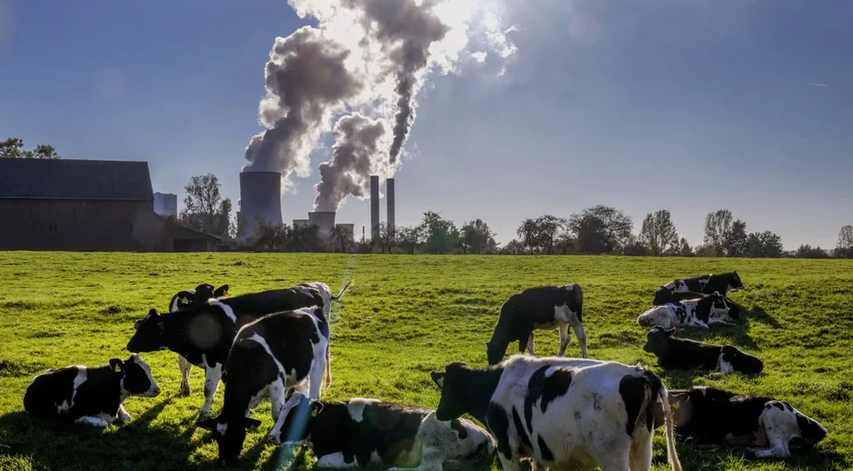In 2021, global carbon pollution returned almost to 2019 levels, after a drop during the lockdowns of the pandemic year 2020. Copyright 2021 The Associated Press. All Rights Reserved The production and trade of goods is at the heart of the globalised market and has a significant environmental impact. Yet there was little discussion at COP26 on how to make it more sustainable, the former director of the World Trade Institute (WTI) tells SWI swissinfo.ch. The goods we buy come from all over the world – and the majority aren’t produced sustainably. Thomas Cottier, emeritus professor at the University of Bern and former managing director of the WTI, believes that making the right commercial decisions and rewarding imported goods that are produced in a sustainable
Topics:
Swissinfo considers the following as important: 3.) Swissinfo Business and Economy, 3) Swiss Markets and News, Business, environment, Featured, newsletter
This could be interesting, too:
Nachrichten Ticker - www.finanzen.ch writes Die Performance der Kryptowährungen in KW 9: Das hat sich bei Bitcoin, Ether & Co. getan
Nachrichten Ticker - www.finanzen.ch writes Wer verbirgt sich hinter der Ethereum-Technologie?
Martin Hartmann writes Eine Analyse nach den Lehren von Milton Friedman
Marc Chandler writes March 2025 Monthly

In 2021, global carbon pollution returned almost to 2019 levels, after a drop during the lockdowns of the pandemic year 2020. Copyright 2021 The Associated Press. All Rights Reserved
The production and trade of goods is at the heart of the globalised market and has a significant environmental impact. Yet there was little discussion at COP26 on how to make it more sustainable, the former director of the World Trade Institute (WTI) tells SWI swissinfo.ch.
The goods we buy come from all over the world – and the majority aren’t produced sustainably. Thomas Cottier, emeritus professor at the University of Bern and former managing director of the WTI, believes that making the right commercial decisions and rewarding imported goods that are produced in a sustainable manner could significantly help to achieve the climate targets set at the last UN conference on climate change (COP26).
These include keeping global warming within 1.5 degrees Celsius compared to pre-industrial levels and mobilising at least $100 billion (CHF92.3 billion) in climate finance to developing countries per year.
A good example of this is Switzerland’s free trade agreement with Indonesia, which allows for subsidised imports of palm oil as long as it meets sustainability standards.
Nonetheless, the question of how trade measures could curb climate change was barely addressed at the COP26 which took place in Glasgow last November. This is a missed opportunity, according to Cottier. He argues that governments need to focus on green infrastructure and industrial production instead of consumers.
SWI swissinfo.ch: What conclusions do you draw from the decisions taken at COP26 in November?
Thomas Cottier: The decisions taken in Glasgow on the basis of the Paris Accord of 2015 are essentially unilateral commitments by states. The international community doesn’t really have the means to make them binding. If countries like India and China don’t make clear commitments, not much can be done. Besides, too little finance has been secured for climate change adaptation measures in developing countries, and industrialised countries are yet to pledge contributions to the Green Climate Fund [a global platform to respond to climate change by investing in low-emission projects] and other tools.
SWI: So more needs to be done…
T.C: Definitely, I would say so. There was no real discussion on trade measures at COP26 to advance the goals of the conference. Many of the measures taken by countries will affect the international trade in goods and services. Countries should seek to find common ground in the World Trade Organisation (WTO).
So far, the Geneva-based WTO and its members have taken a rather passive stand. They refrain from pro-actively addressing the problem of climate change or biodiversity, except in the ongoing negotiations on fisheries, which seek to reduce fossil fuel subsidies for fishing fleets.
On the upside, important progress was made in the accounting of carbon emissions, which is crucial to define a globally valid carbon price and carbon trading system.
SWI: Which trade issues do you think should be prioritised?
T.C.: The most important one relates to the recognition of Processes and Production Methods (PPMs). These define the processing of goods and services. It is of increasing importance how a particular product is made, whether in a sustainable manner or not. Market conditions vary depending on the sustainability of the production cycle.
For example, the recognition of PPMs facilitates market access for sustainably produced steel, by means of using hydropower, thermal energy, wind, solar hydrogen, but impose higher tariffs for fossil fuel-based and thus polluting products.
Why processes and production methods matter
According to the Organisation for Economic Co-operation and Development (OECD), the term PPMs (Processes and Production Methods) defines the way in which products are manufactured or processed. It also takes into account how natural resources are extracted or harvested.
PPMs can have significant environmental impacts. The processes and the methods used in production can affect the characteristic of a product, which could pollute or degrade the environment when it is used. But even a process or a method itself could have an environmental footprint, for instance by releasing pollutants into the air or water.
PPM-related policies are important tools for promoting sustainable development, for example by ensuring that the producers bear the costs of environmental damage.
End of insertion
WTO dispute settlement rules allow, under certain conditions, to take this into account, but the matter should be negotiated more broadly. It should also be linked to rules on transfer of sustainable technologies and knowledge to developing countries, which generally consider PPMs as protectionist and disguised trade restrictions.
But this requires new measures to incentivise access to intellectual property, in particular patents, for example by means of tax rebates to exporters. Other issues relate to future rules on linking electricity grids transnationally with a view to facilitate trade in hydro, wind and solar energy, all of which depend on varying weather conditions.
“At the moment, we are still too dependent on voluntary and unilateral commitments, which do not entail any obligations under international law.”
End of insertion
SWI: Why is it that, in our globalised world, trade measures are not really taken into account in global climate change policies?
T.C: The reasons mainly come down to the departmentalisation of policies and responsibilities in the way governments are organised. In Switzerland, for example, the Federal Department of the Environment, Transport, Energy and Communications (DETEC) is responsible for climate change negotiations at COPs.
The Federal Department of Economic Affairs, Education and Research (EAER), which is responsible for international trade, is not directly involved. And the Department of Foreign Affairs (FDFA) does not coordinate international efforts, nor does the Federal Council.
If we are looking for models which are efficient, we can look to the European Union and its comprehensive policies and programmes developed within the Green Deal and related instruments.
Due to its market power, the EU is in a position to proactively define the agenda by taking unilateral measures, such as carbon trading or Carbon Border Adjustment (CBAM) [the European carbon tax that aims to protect European industries from competition from foreign companies not subject to climate standards].
The latter uses PPMs to compensate for unfair competition caused by imports that were not produced sustainably. These concern, for example, the import of cheap steel that was made using fossil fuels compared to sustainably produced steel that is more expensive. Trade and environment are better coordinated in the EU than in Switzerland.
SWI: Can we say that PPMs are useful tools to understand the whole supply chain of a given product and assess its sustainability? How can a product’s real environmental impact be determined?
T.C: Under classic rules of non-discrimination, imported products are entitled to the same taxes and regulations as domestic products. In principle, the modes of production are irrelevant. The principle of sustainability, balancing economic, social and environmental concerns, changes this equation. The protection of labour standards and environmental concerns, such as climate change or biodiversity, are now taking center stage.
PPMs allow importing countries to assess the social and ecological impact in the country of production. It will not be a matter of tracing the origins of all products and their components, and how they were produced. This would be practically impossible. Rather it is about focusing on a number of highly polluting products, such as cement, steel and other metals, and electricity and other basic commodities.
At the moment, we are still too dependent on voluntary and unilateral commitments, which do not entail any obligations under international law. This is why we need to refine the system with trade measures and create an appropriate framework for this in the WTO, or to the same extent in preferential bilateral agreements.
SWI: What would these measures look like?
T.C: A recent example concerns Switzerland and the EFTA [the European Free Trade Association] free trade agreement with Indonesia on palm oil. This agreement implements the PPM paradigm shift. Preferential tariff quotas on palm oil imported from Indonesia are tied to sustainable production methods and agreed standards.
“The energy transition is a major challenge for all countries, but particularly for a direct democracy.”
End of insertion
SWI: You mention a positive example from Switzerland, but Swiss voters rejected the proposed CO2 law. So where could Switzerland improve?
T.C: The rejection of the CO2 law should teach us that it is important to adopt technology transfer measures which are compatible with social justice. It is difficult to treat cities with dense public transport the same way as the countryside, where individuals depend on cars or decentralised heating. Approaches which focus too much on consumers are difficult to push through in referendums. Instead, the focus should be on infrastructure, production, industry and longer-term transitions. These entail chances to create growth, new technologies and new jobs.
SWI: An assessmentExternal link by the think tank Climate Analytics says Switzerland’s efforts to curb climate change are insufficient and if other countries followed suit, temperatures could rise up to 4 degrees Celsius by the end of the century. Meanwhile imports have risen sharply in recent years which means a greater carbon footprint. The outlook looks pretty grim…
T.C: If we include imports in the overall footprint, Switzerland indeed still has a lot of homework to do, on all levels of governance – federal and cantonal. A lot depends on the policies of the bigger cities, which should be enhanced. The energy transition is a major challenge for all countries, but particularly for a direct democracy.
Switzerland will need to cooperate closely with the EU in order to reach its climate goals. And on the international level, the country could propose initiatives on trade to the WTO and seriously commit by streamlining its globally operating financial sector for sustainable investment. Corporate social responsibility remains on the agenda.
Tags: Business,Environment,Featured,newsletter








